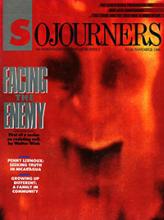For months now the question about 700 Club host Marion G. "Pat" Robertson has been: "Will he run?" Now that Robertson's candidacy for the Republican presidential nomination is a near-certainty, politicians and church people alike are presented with a number of considerably more vexing questions.
Certainly Robertson's candidacy represents a potentially disruptive wild card for the Republican Party's hope to become the majority party in 1988. The Christian Right is no longer just another Republican constituency among others. With Robertson's candidacy the Far Right is now staking its claim to represent the future of the party and the country. But the Religious Right's social agenda has yet to excite anything like a majority among the American people.
For Robertson's colleagues in the Religious Right, his candidacy presents a crisis of loyalty between one of their own and the wishes of the president to whom they have sworn allegiance and hitched their star for the last six years. Already Jerry Falwell has announced his support for the Reagan-anointed George Bush.
For the rest of us in the Christian community, Robertson's candidacy presents a very different set of questions and challenges. One has to do with the very nature of "Christian politics." In every U.S. presidential election since 1976, religion and politics have become more closely intertwined. But Robertson's campaign is already pushing that question to a new level of intensity.
Read the Full Article

